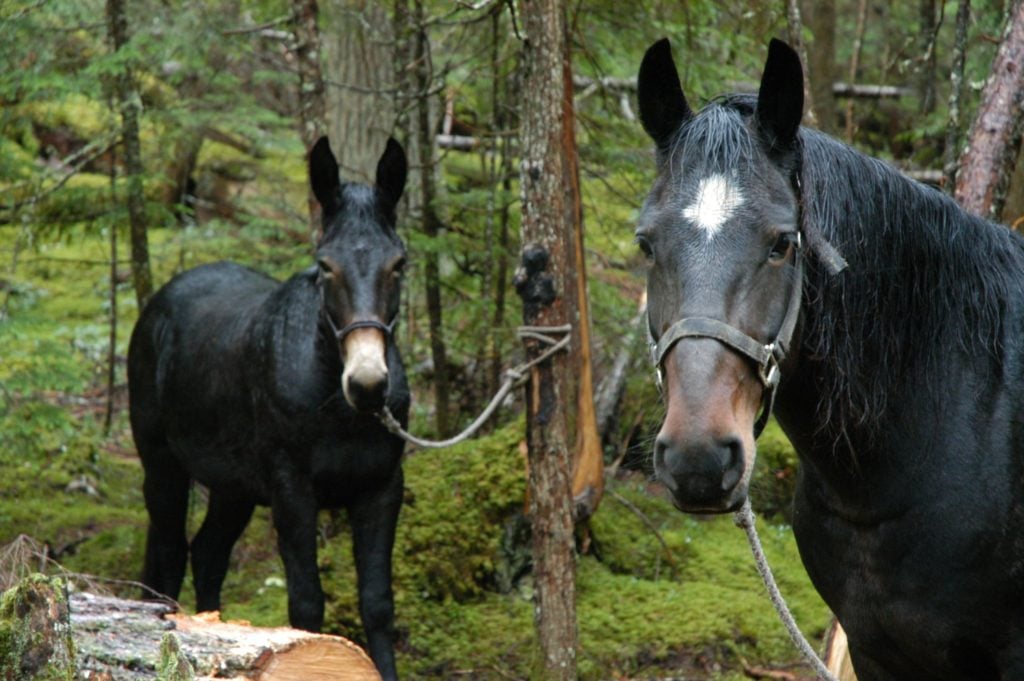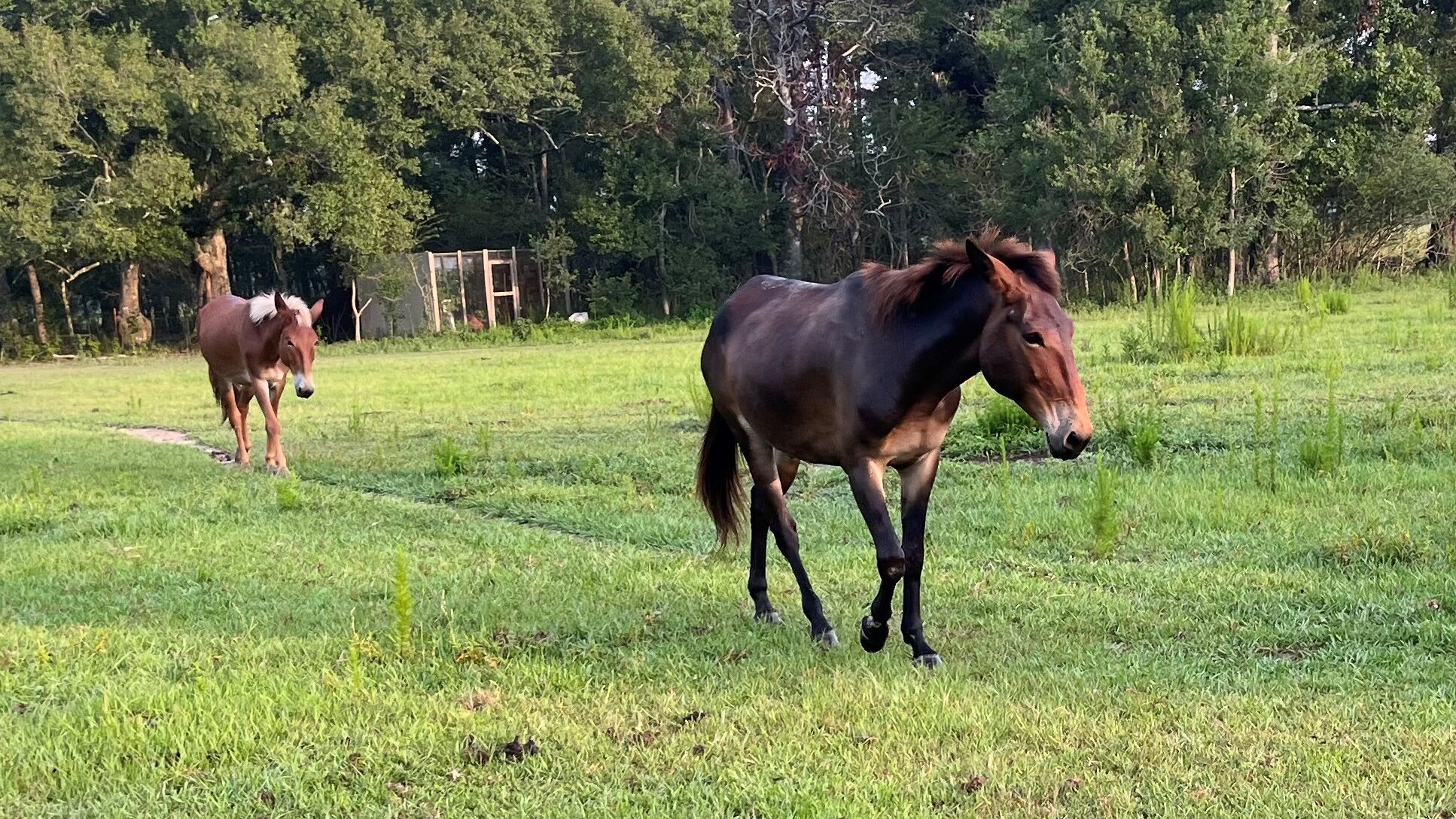Last updated: March 4, 2024
Did you know mules are sterile? This intriguing fact unveils the complex relationship between mules and horses, creatures that have captivated equestrians, farmers, and animal enthusiasts with their distinct differences, preferences, and traits. As someone who has ridden and owned these animals, I have a good perspective to compare them.
Yet, this article goes beyond personal experience, incorporating insights from long-time owners and experts. Together, we explore their roles, physical attributes, behaviors, and suitability for various tasks, offering a comprehensive look at what sets mules and horses apart. Join me in uncovering the nuanced world of mules and horses.

Horses vs. Mules in Speed, Strength, and Agility
In the equine world, horses and mules are often compared for their abilities in speed, strength, and agility. Here’s an overview of how they stack up against each other in these areas:
Speed and Performance
- Horses: Known for their speed, horses can reach an average of 30 miles per hour. This is attributed to their long legs and lightweight bodies, designed for swift movement.
- Mules: Typically, mules have a top speed of around 15 miles per hour. While some, like the racing mule Black Ruby, show impressive speed, they generally don’t match horses in racing contexts.
Strength and Endurance
- Mules’ Strength: Mules excel in strength, particularly in pulling and carrying. They can carry about 30% of their body weight, surpassing horses, which carry around 20%.
- Horses in Endurance: Horses are preferred for activities requiring speed and stamina, like long-distance riding.
Jumping Abilities
- Horses: Specialized breeding has made horses adept at jumping, excelling in equestrian disciplines like show jumping and eventing.
- Mules: While capable of jumping, mules are not typically bred for high-performance jumping. They do participate in unique competitions like “coon jumping.”
Intelligence and Responsiveness
- Mules’ Intelligence: Mules are often considered smarter than horses, learning quickly and remembering adverse experiences.
- Horses’ Responsiveness: Horses tend to respond more promptly to commands and are preferred for their smoother gait in trail riding.
Genetic Differences
- Chromosomes: Horses have 64 chromosomes, while donkeys have 62. Mules, as a hybrid, end up with 63 chromosomes, rendering them sterile.
While horses are celebrated for speed and endurance, mules are lauded for their strength, intelligence, and sure-footedness. Each has unique advantages, making them suitable for different tasks and environments.

Physical Differences: Mules vs Horses
Understanding the physical differences between mules and horses is key to appreciating their unique characteristics and care needs. Here’s a condensed overview of their conformational differences:
- Head and Ears: Mules typically have longer heads, akin to their donkey sire, and notably long ears, often reaching up to 33 inches. These long ears can be sensitive, leading to the use of specially designed ‘mule bonnets’ for riding.
- Feet and Hooves: Mules have smaller, tougher hooves compared to horses. Their hooves are concave and more upright, with low heels and big frogs, making them less prone to foot problems than horses.
- Body Structure: While mules inherit much of their body structure from their horse dam, including height and hindquarters, they often have deeper chests and higher withers and carry more weight on their front end. Their muscling is smoother, with thinner limbs and smaller hooves from their donkey sire.
- Coat and Skin: Mules have coarser coats than horses, which can vary in color but are mostly brown or bay. They adapt their coat thickness seasonally and are less likely to develop skin irritations than horses.
- Vocalizations: Mules and horses have distinct vocal sounds. A mule’s vocalization is a unique blend of a donkey’s hee-haw and a horse’s whinny, whereas horses typically neigh and whinny.

These conformational traits not only distinguish mules from horses but also contribute to their suitability for different tasks and environments. Understanding these differences is crucial for proper care and management.

Practical Uses and Suitability: Mules vs Horses in Various Roles
The choice between a mule and a horse often hinges on the specific tasks they are expected to perform. Both animals have distinct strengths, making them more suitable for different roles. Let’s explore how mules and horses fare in various practical applications supported by real-world examples and case studies.
Agriculture and Farm Work
- Horses: Traditionally used in farming, certain horse breeds excel in pulling plows and carts. For instance, draft horses like Clydesdales have been the backbone of agricultural labor in many parts of the world.
- Mules: Mules, known for their endurance and strength, are often preferred for tasks that require sustained effort over long periods. In regions with rugged terrain, mules are invaluable for transporting goods across difficult paths where horses might struggle.
Trail Riding and Trekking
- Horses: For recreational trail riding, horses, with their speed and agility, offer a smooth ride. They are well-suited for open trails and are often chosen for their responsiveness to rider commands.
- Mules: In contrast, mules are the preferred choice for treks in challenging terrains, such as mountainous regions. Their sure-footedness and ability to navigate narrow paths make them reliable companions. A notable example is the use of mules in the Grand Canyon, where they safely carry tourists along steep and rocky trails.
Pack Animals and Load Carrying
- Mules: Mules have a higher capacity for carrying loads relative to their body weight compared to horses. This makes them ideal for long-distance transportation of goods, especially in less accessible areas.
- Horses: While horses can also serve as pack animals, they are generally more suited to lighter loads and shorter distances.
Competitive Sports and Shows
- Horses: Horses dominate most equestrian sports, including racing, show jumping, and dressage. Their speed and agility are unmatched in these arenas.
- Mules: Mules have started to make their mark in competitive sports, particularly in dressage and coon jumping events. Their unique style and abilities bring diversity to the equestrian sports world.
Case Study: Mules in Vineyard Management
In some European vineyards, mules are preferred over horses for their ability to work in narrow rows without damaging the vines. Their calm demeanor and precise movements make them ideal for such delicate tasks.
Case Study: Horses in Mounted Police Units
Many police units across the globe use horses for patrol, especially in crowded urban areas. Their height gives officers a vantage point, and their presence is often seen as non-threatening by the public.
The choice between a mule and a horse significantly depends on the specific requirements of the task at hand. While horses may excel in speed and agility, mules stand out for their strength, endurance, and stability in challenging environments. Knowing these differences allows for the optimal use of each animal’s unique capabilities.
Health, Lifespan, and Care Requirements: Mules vs Horses
Understanding the health, lifespan, and care requirements of mules and horses is crucial for anyone considering working with or caring for these animals. Each species has unique needs and characteristics that affect their overall well-being.
Health Issues and Lifespan Differences
- Horses: The average lifespan of a horse ranges from 25 to 30 years, though this can vary based on breed, care, and environment. Common health issues in horses include colic, laminitis, and respiratory problems. Their larger size and speed also make them more prone to leg injuries.
- Mules: Mules are generally hardier and have a longer lifespan, often living into their 30s or even 40s. They are less susceptible to many of the health issues that affect horses, such as colic and hoof diseases. This increased resilience is attributed to their hybrid vigor, a result of crossbreeding.
Care Requirements for Horses
- Diet: Horses require a balanced diet that includes hay, grass, grains, and a sufficient water supply. Their feeding needs vary based on age, activity level, and health status.
- Shelter and Space: Adequate shelter is necessary to protect horses from extreme weather conditions. They also need ample space to roam and exercise, which is crucial for their physical and mental health.
- Grooming and Hoof Care: Regular grooming helps maintain a healthy coat and skin, while routine hoof care prevents hoof diseases and ensures proper foot alignment.
Care Requirements for Mules
- Diet: Mules have a more efficient digestive system than horses and often require less feed. However, their diet should still be well-balanced, with attention to avoiding overfeeding.
- Shelter and Exercise: Like horses, mules need proper shelter and space. They are adaptable to various climates but still require protection from harsh weather.
- Grooming and Hoof Care: Mules benefit from regular grooming, although their coat and skin are generally less prone to issues than horses. Their hooves are tougher but still require regular trimming and care.
Special Considerations
- Mules’ Temperament in Care: Mules may require a more patient and consistent approach in handling, especially for medical care or grooming, due to their intelligent and sometimes stubborn nature.
- Monitoring for Health Issues: Regular veterinary check-ups are essential for both horses and mules to monitor and address any health concerns promptly.

Expert Insights and Personal Experiences: Mules vs Horses
Gaining insights from experts and those with personal experiences in handling mules and horses can provide invaluable perspectives. Here, we share contributions from seasoned equestrians and personal anecdotes that shed light on the unique aspects of these animals.
Insights from Equestrians
- Equestrian Perspectives: Experienced riders often note the distinct personalities between mules and horses. Mules are praised for their intelligence and caution, making them reliable in unpredictable situations. Horses, on the other hand, are admired for their agility and responsiveness, especially in competitive settings.
- Behavioral Observations: Animal behaviorists highlight that mules tend to have a strong sense of self-preservation, which can be mistaken for stubbornness. This trait makes them carefully assess situations before acting, unlike horses, who might react more instinctively.
Personal Anecdotes
- A Trail Rider’s Tale: Richard Jacoby shared his experience of a multi-day trek where their mule consistently chose safer paths over treacherous terrain, demonstrating the animal’s innate ability to navigate safely. In addition, when a deer jumped out in front of us, his mule didn’t flinch.
Case Studies
- Mule in Mountain Rescue: A case study from a mountain rescue team illustrated how a mule played a crucial role in safely transporting supplies and injured hikers in areas where horses struggled.
- Horse Therapy Program: An example from a therapeutic riding program showed how horses, with their gentle and empathetic nature, effectively connected with and aided individuals with special needs.
Expert Tips for Potential Owners
- Choosing the Right Fit: Experts advise potential owners to consider their lifestyle, the type of work or activity they intend to engage in, and their experience level before deciding between a mule and a horse.
- Training and Care: Both equestrians and behaviorists emphasize the importance of understanding the distinct training and care approaches required for mules and horses to foster a strong and positive relationship.
Frequently Asked Questions (FAQs)
Is it true that mules are sterile?
Yes, mules are typically sterile due to having an uneven number of chromosomes. This results from being a cross between a horse (64 chromosomes) and a donkey (62 chromosomes).
Are mules smarter than horses?
Mules are often praised for their intelligence, which includes a strong memory and problem-solving abilities. This does not necessarily mean they are smarter, but that mules and horses exhibit intelligence differently.
Are mules harder to train than horses?
Mules are not necessarily harder to train but require a different approach. Their intelligence and strong memory mean they respond well to consistent, patient training methods. They may not respond well to force or inconsistency.
Can mules and horses perform the same types of work?
While there is some overlap, mules and horses are suited to different types of work. Mules excel in tasks requiring endurance and careful footing, such as trail riding in rough terrain. Horses are better suited for speed and agility-based activities like racing and show jumping.
What are some common misconceptions about mules?
Common misconceptions include that mules are always stubborn, difficult to train, or less capable than horses. In reality, mules are intelligent, versatile, and can be very cooperative when treated with patience and respect.
Is the temperament of mules different than that of horses?
Mules are generally known for their patience, intelligence, and caution, often assessing situations before acting. Horses, conversely, are more instinctive and can be more reactive, making them agile and responsive.

In a Nutshell: The Advantages of Owning a Mule Over a Horse
Owning a mule offers several distinct advantages compared to owning a horse, many of which stem from their unique heritage and hybrid vigor:
- Hardiness and Adaptability: Mules inherit the toughness of their donkey parent, making them resilient to various climates and terrains.
- Lower Maintenance Needs: Generally, mules are less prone to health issues like colic or laminitis and require less frequent hoof care due to their stronger hooves.
- Greater Carrying Capacity: Mules can carry a higher percentage of their body weight, making them ideal for heavy load carrying and long treks.
- Sure-Footedness: Known for their ability to navigate challenging terrains, mules are a reliable choice for trail riding and working in difficult environments.
- Longevity: Mules enjoy a longer lifespan than horses, potentially leading to lower long-term ownership costs.
- Intelligence and Temperament: Mules are typically more intelligent, cautious, and level-headed, reducing the risk of injury in unfamiliar situations.
- Disease Resistance: They tend to be more resistant to common equine diseases, contributing to their hardiness.
Historical Note: George Washington’s Contribution
George Washington played a significant role in popularizing mules in America. He recognized their value for agricultural work and transportation, breeding high-quality mules renowned for their strength and endurance. This initiative significantly contributed to the development of the country’s agricultural industry.
Conclusion: Mule vs. Horse
As we reach the end of our exploration into the fascinating worlds of mules and horses, it’s clear that both animals possess distinct qualities and capabilities that make them invaluable in various contexts. Here are the key takeaways from our journey:
- Diverse Strengths: Horses, known for their speed and agility, excel in sports and recreational activities, while mules stand out for their endurance, strength, and sure-footedness, especially in challenging terrains.
- Unique Care Needs: Both species require dedicated care, but mules generally have a longer lifespan and are more resilient to health issues, thanks to their hybrid vigor.
- Intelligence and Temperament: Mules are often celebrated for their intelligence and cautious nature, whereas horses are admired for their responsiveness and instinctive reactions.
- Suitability for Tasks: The choice between a mule and a horse should be based on the specific requirements of the task at hand, considering factors like terrain, load, and the nature of the activity.
- Misconceptions and Learning: Addressing common misconceptions about mules and horses helps understand and appreciate their true nature and abilities.
We encourage you, our readers, to continue exploring and learning about these remarkable animals. Whether you’re a seasoned equestrian, a farm owner, or an animal enthusiast, there’s always more to discover about mules and horses.
We’d Love to Hear from You!
- Share your experiences: Do you have personal stories about working with mules or horses? We’d love to hear them!
- Ask questions: If you have any queries or need advice, please reach out.
- Suggest topics: Is there an aspect of mule or horse care and management you’d like to know more about? Let us know!
Poll Question
Your interactions enrich our community’s knowledge and passion for these incredible animals. Thank you for joining us on this enlightening journey through the world of mules and horses.
Additional Resources: Expanding Your Knowledge on Mules and Horses
For those eager to dive deeper into the world of mules and horses, a wealth of resources is available. Below are links to further reading and references, including scientific research and expert opinions, to enhance your understanding and appreciation of these remarkable animals.
Further Reading and Online Resources
- The Horse: Your Guide to Equine Health Care: A comprehensive resource for horse health and care. Visit The Horse
- American Mule Association: An excellent source for information on mules, their care, and activities. Visit American Mule Association
- Equus Magazine: Offers a range of articles on horse behavior, training, and health. Visit Equus Magazine
Scientific Research and Articles
- “Are Horses Native to North America?” Offers insights into the evolutionary journey of horses. Read the Article
- “Mule Behavior and Welfare” in Animal Welfare Journal: A study focusing on the behavioral patterns and welfare needs of mules. Access the Study
Online Forums and Communities
- The Chronicle of the Horse Forum: A platform for horse enthusiasts to discuss various topics related to horse care, training, and riding. Join the Discussion
- Mules and More Magazine: Offers a community forum for mule and donkey enthusiasts. Explore Mules and More
These resources provide a mix of scientific insights, practical advice, and community wisdom, catering to a wide range of interests and needs. Whether you’re seeking in-depth knowledge, practical tips, or a community of fellow enthusiasts, these references are invaluable for anyone passionate about mules and horses.

About the Author: Miles Henry
Lifelong Horseman | Racehorse Owner | Published Author
Miles Henry brings over 25 years of hands-on experience training and owning Thoroughbred racehorses. Raised with Quarter Horses and Appaloosas, he’s spent a lifetime learning from horses—on the track, in the barn, and in the field. Today, he runs a small but successful racing stable in Louisiana and shares real-world insights on HorseRacingSense.com, helping horse owners, fans, and bettors navigate the sport with confidence.
📚 Books: View Miles’s books on Amazon »
🎧 Podcast Guest: Animal Tales Ep. 32 |
YouTube Interview
📩 Newsletter: Sign up for racing tips and horse care advice »
🔗 Follow Miles:
Twitter |
Facebook |
YouTube





